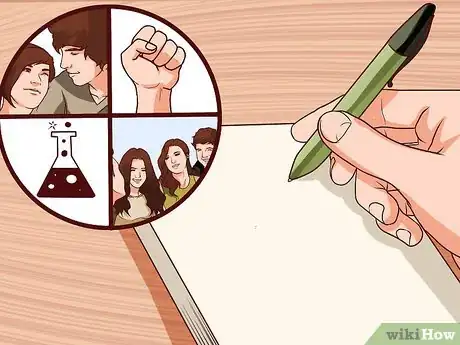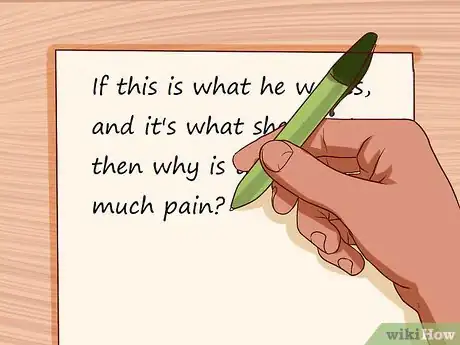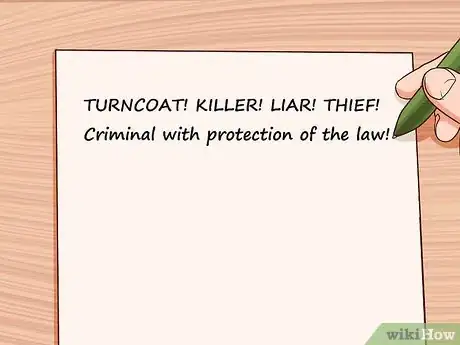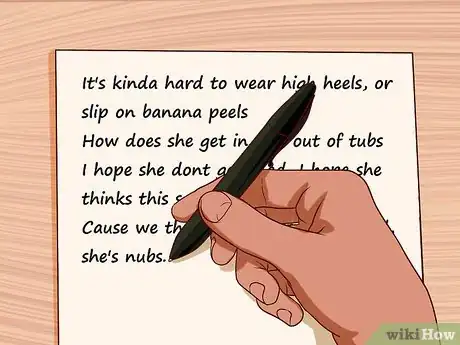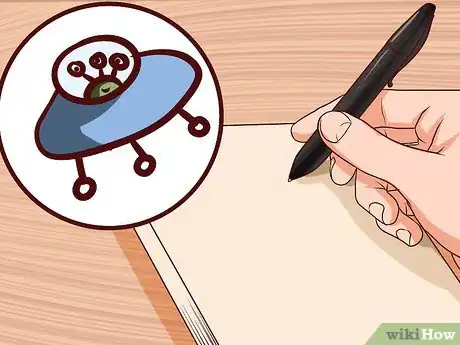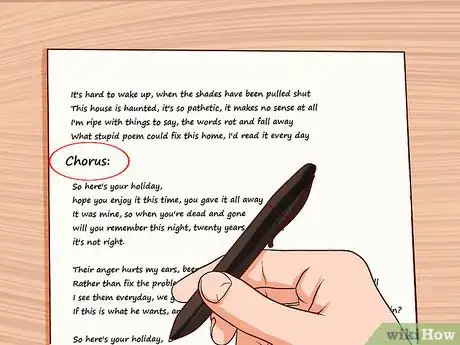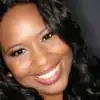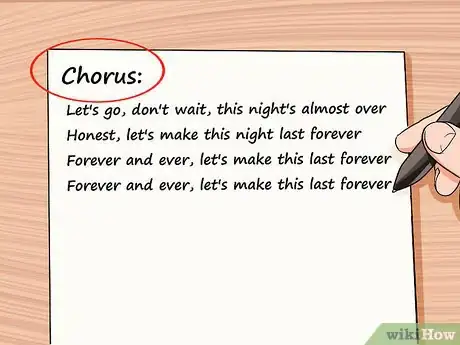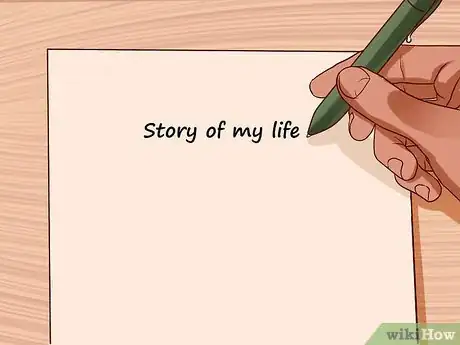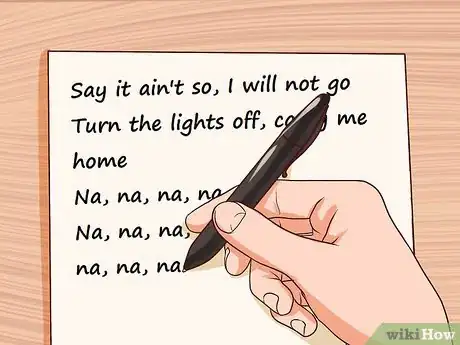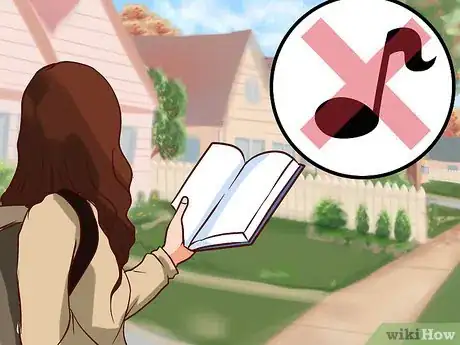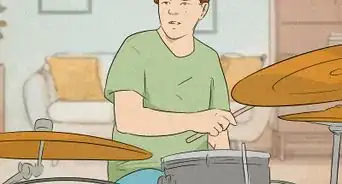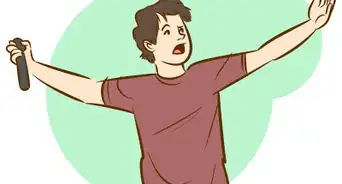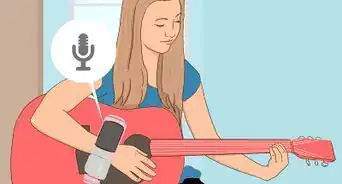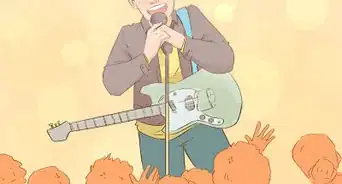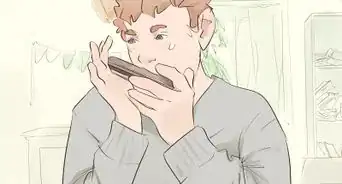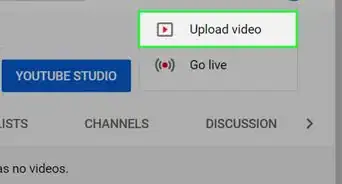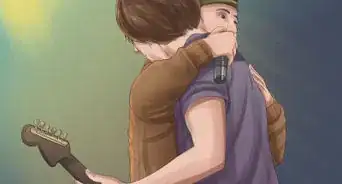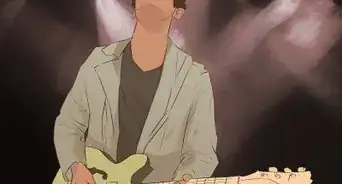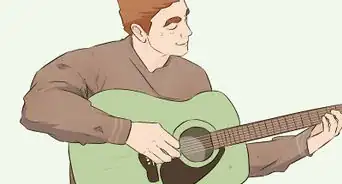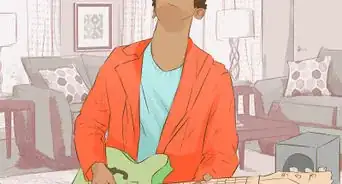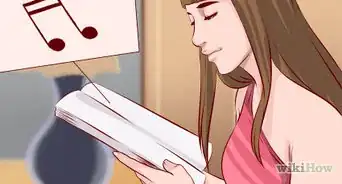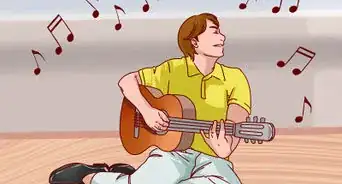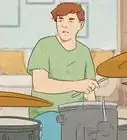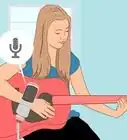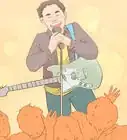This article was co-authored by Tanisha Hall. Tanisha Hall is a Vocal Coach and the Founder and Executive Director of White Hall Arts Academy, Inc. an organization based in Los Angeles, California that offers a multi-level curriculum focused on fundamental skills, technique, composition, theory, artistry, and performance at a conservatory level. Ms. Hall's current and previous students include Galimatias, Sanai Victoria, Ant Clemons, and Paloma Ford. She earned a BA in Music from the Berklee College of Music in 1998 and was a recipient of the Music Business Management Achievement Award.
This article has been viewed 65,331 times.
Pop punk is a type of music with pop melodies and punk rock appeal. Typically, it takes on the hard, guitar-driven edge of punk while crafting catchy hooks, universal lyrics, and less hard-core instrumentals. Pop punk is an incredibly broad and inclusive genre, meaning there are very few, if any, lyrical topics that are off-limits.
Steps
Finding a Song Topic
-
1Base your songs around just one image, thought, or thing. The most common topics in pop punk are love, adolescence, and youthful rebellion, but the beauty of the genre is how open it is. You can talk about politics, people, science fiction, or a night at the bar with your friends. The important thing is to keep it contained to one idea instead of cramming in 2-3. Pop punk songs are short, and you'll be much more effective focusing on just one idea for each song.
- In general, pop punk songs have 2-3 choruses, 2-3 verses, and maybe one breakdown, usually without lyrics. You can also consider a chant or call and response section for audience participation, but that's about as complex as most pop punk song structures get.[1]
-
2Dive deeply into person angst or worries, from relationships to school. Pop punk is generally a very personal medium. Your fears, stress, and anger all make great, raw emotions for a pop song, so don't shy away from your personal life and opinions. Punk is an open, DIY genre, and you should add your own take to your songs. While traditional "punk" steers free of emotional songwriting, pop-punk bands like Screeching Weasel, Good Charlotte, and more have proven that there is a demand for emotionally honest songwriting.
- Love and heartbreak
- Suburban angst
- Rebellion against school, parents, etc.
- Growing up.[2]
Advertisement -
3Tap into the classic punk tradition of anti-establishment, political songwriting. Green Day's album American Idiot, perhaps the most famous pop-punk political statement, is really just one album in a long tradition of socially conscious, politically informed punk rock music. Typically, the mood is rebellious and angry -- pointing out problems others won't in an attempt to bring about awareness about the issues you care about. Bands like "The Clash," "Bad Religion," and "Anti-Flag" can be powerful mentors. Some angles include:
- Attacking a powerful political figure, like in Anti-Flag's "Turncoat."
- Exposing an issue or ignored topic, like The Clash's "Spanish Bombs" or "Washington Bullets."
- Mocking satire, pretending to be a political opponent to show how terrible their views are ("Kill the Poor.")
-
4Don't be afraid to throw in a sense of humor. Throughout the history of Pop-punk, pranksters, jokers, and biting satirists have shown that pop-punk can be just as funny as it is powerful, personal, or political. From NOFX's "She's Nubs," most of Blink 182's early library, or the self-aware The Steinways, don't be afraid to write a silly, juvenile song just to get a quick laugh.[3]
-
5Know that there is no limit to your songwriting talents and topics. The Lillingtons, for example, wrote most of their songs in an imaginary sci-fi universe, building up stories and ideas through futuristic lyrics. If you feel like writing a cowboy anthem in the vein of Social Distortion, go for it. There is nothing stopping you from crafting a pop-punk jam from Batman's perspective, or the mind of a monkey. Pop punk is a wide-open and inclusive genre, so write what you want to write.
Crafting Memorable Lyrics
-
1Draft out the ideas or lines you want in your song. Sometimes the lyrics just start flowing, but more often than not writer's block sets in. Power through it by sketching out the ideas, thoughts, or essential images you want in the songs. If you think of a line or rhyme, jot it down even if you don't know how to use it yet. Once you have your key images and words, you can start building lines around them.[4]
- Even one good line can be the basis of a song, used as a chorus or a refrain to hold the song together.
- Don't think of writing the whole song in one linear sitting. Just start writing parts and fragments, and slowly you'll start to see those that fit well together.[5]
-
2Begin with a simple, catchy chorus, as it's an essential part of most pop punk. Pop songs, no matter the genre, need to hook the listener and get stuck in the brain. It should be easily remembered, a short, simply phrase with a hummable melody. Think of this as the 1-2 sentences that sum up your entire song theme.
- Once you've written the lyrics, try humming or whistling out tunes to find a good melody. When it is catchy even without words, you've got a killer chorus to use.
- Green Day, Rancid, Operation Ivy, and Blink-182 are great bands who shot to popularity because they can write killer hooks, not just driving lyrics.
-
3Keep your verses short, using the same length and rhyming for each one. More likely than not you'll write in couplets -- where each set of two lines rhymes with each other ("I can see into your soul / because you're just a victim of mind control").[6] You can also rhyme every line with each other, or rhyme ever-other line together ("hey" / "me" / "day" / "we") for a more melodic, sing-song feel. If you're stuck fleshing out the lyrics:
- Tell a tale or story ("Timebomb")
- String together related moments or images on the same theme ("Story of my Life.").
- Approach the topic from new places or perspectives each verse ("Longview")
-
4Think about adding a sing-along section or chant to a few songs. The sing-alongs, which are usually "lalalas" "oooohhhs" and "ahhhhhhs," are a staple of pop-punk because it gets the audience involved. Frequently, the best place for a sing-along is the chorus or the outro, but you can place them everywhere. You don't need one in every song as it can get old. However, even a "lyric" as simple as "nananana nanananana" in "All the Small Things" can be the difference between a dud and a hit.
-
5Read and cover other pop-punk songs to learn from the greatest. When people commonly talk about how the Beatles or Bob Dylan were the best songwriters of their generation, they usually point to their years playing 100's of different rock or folk cover songs. You can do the same thing with pop punk. Covering songs helps you feel out things that work, learning from the very best as you subconsciously internalize song structure, lyric tricks, and catchy melody lines.
- Cover the songs you like to play more like the bands you admire.
- Reading lyrics without the music is a good way to see how lyrics are written, and a good way to compare you own.
Expert Q&A
-
QuestionHow do you write a song like Green Day?
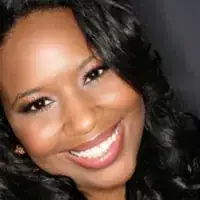 Tanisha HallTanisha Hall is a Vocal Coach and the Founder and Executive Director of White Hall Arts Academy, Inc. an organization based in Los Angeles, California that offers a multi-level curriculum focused on fundamental skills, technique, composition, theory, artistry, and performance at a conservatory level. Ms. Hall's current and previous students include Galimatias, Sanai Victoria, Ant Clemons, and Paloma Ford. She earned a BA in Music from the Berklee College of Music in 1998 and was a recipient of the Music Business Management Achievement Award.
Tanisha HallTanisha Hall is a Vocal Coach and the Founder and Executive Director of White Hall Arts Academy, Inc. an organization based in Los Angeles, California that offers a multi-level curriculum focused on fundamental skills, technique, composition, theory, artistry, and performance at a conservatory level. Ms. Hall's current and previous students include Galimatias, Sanai Victoria, Ant Clemons, and Paloma Ford. She earned a BA in Music from the Berklee College of Music in 1998 and was a recipient of the Music Business Management Achievement Award.
Vocal Coach If you're inspired by Green Day, the best thing you can do is listen to a lot of Green Day. Try to study their melodies, riffs, lyrics, and singing. You can also sing along to instrumental or karaoke versions of their songs. This will give you a better sense for what makes their songs work so well and why they sound so good to you. Then, you can start incorporating their techniques in your music.
If you're inspired by Green Day, the best thing you can do is listen to a lot of Green Day. Try to study their melodies, riffs, lyrics, and singing. You can also sing along to instrumental or karaoke versions of their songs. This will give you a better sense for what makes their songs work so well and why they sound so good to you. Then, you can start incorporating their techniques in your music. -
QuestionWhat a good start for a punk intro?
 Community AnswerYou could start with a very simple beat if you want to start with music. Or you could write a short lyrical intro or just go straight into the chorus. It's up to you!
Community AnswerYou could start with a very simple beat if you want to start with music. Or you could write a short lyrical intro or just go straight into the chorus. It's up to you! -
QuestionHow can I make people relate to my song?
 Quitty_CatCommunity AnswerKeep things vague when you write your lyrics, and avoid specifics. Alternatively, you could have lyrics with a double meaning, though that may be harder to write.
Quitty_CatCommunity AnswerKeep things vague when you write your lyrics, and avoid specifics. Alternatively, you could have lyrics with a double meaning, though that may be harder to write.
Warnings
- While punk is inclusive, it has its fair share of "haters" like any other genre. Don't ever let someone tell you that your lyrics "aren't punk." That's the least punk thing someone can tell you!⧼thumbs_response⧽
References
- ↑ https://www.youtube.com/watch?v=H7--sDDTsXI
- ↑ http://www.avclub.com/article/beginners-guide-bouncy-buzz-pop-punk-201853
- ↑ http://www.avclub.com/article/beginners-guide-bouncy-buzz-pop-punk-201853
- ↑ Tanisha Hall. Vocal Coach. Expert Interview. 27 March 2020.
- ↑ https://www.ultimate-guitar.com/lessons/songwriting__lyrics/writing_lyrics_things_to_consider.html
- ↑ http://www.plyrics.com/lyrics/cobraskulls/cobraskullslockdown.html
